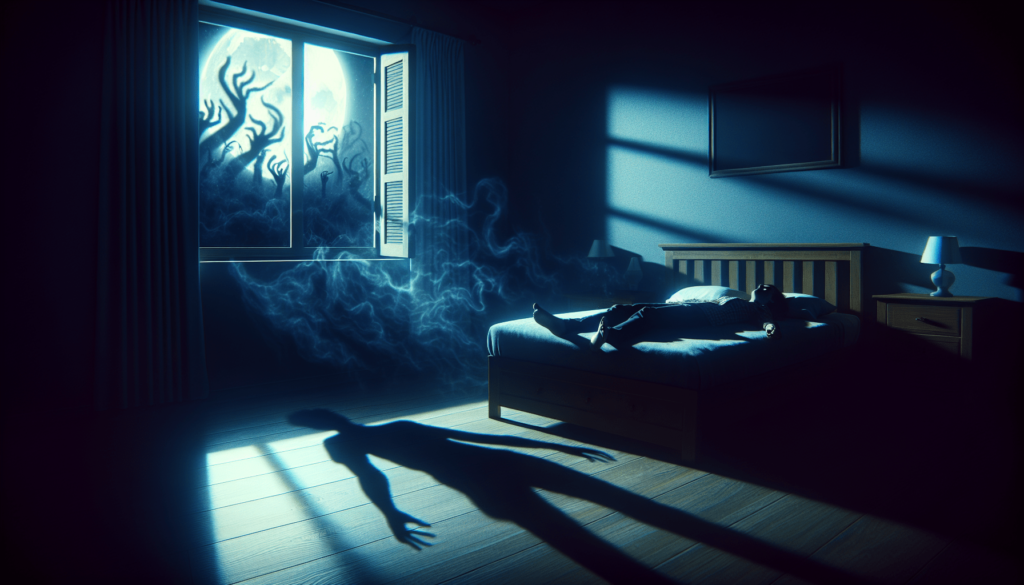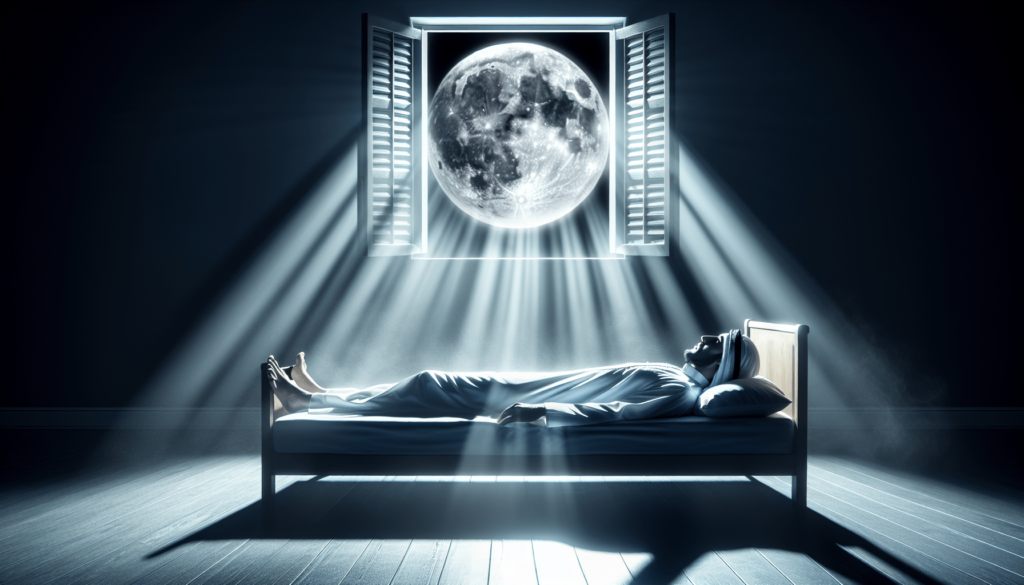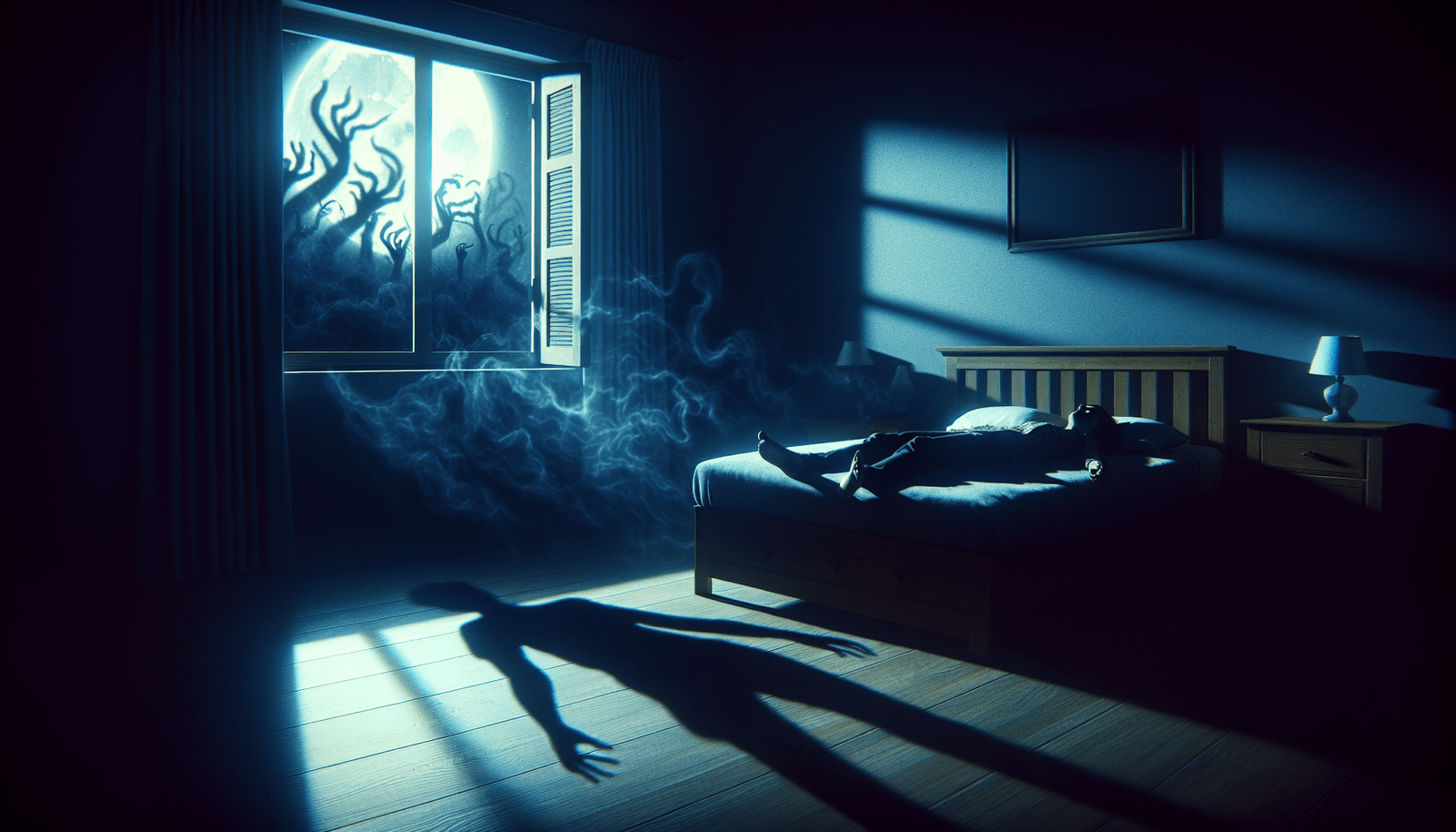So you’re lying in bed, half-asleep, half-awake, and suddenly you find yourself unable to move. It’s as if your body is frozen, and no matter how hard you try, you just can’t make a single muscle budge. Panic sets in as you struggle to understand what’s happening. Welcome to the world of sleep paralysis, a condition that affects countless individuals worldwide. In this article, we’ll explore the phenomenon of sleep paralysis, including its causes, symptoms, and whether or not it poses any real harm to your well-being. So, let’s unlock the secrets of this mysterious and sometimes terrifying experience that can leave you feeling utterly trapped.

Definition of Sleep Paralysis
What is sleep paralysis?
Sleep paralysis is a phenomenon that occurs when you find yourself temporarily unable to move or speak while waking up or falling asleep. During sleep paralysis, your mind is awake, but your body remains in a state of paralysis. It can be a frightening experience, as you are fully conscious and aware of your surroundings, but unable to move or speak.
Prevalence of sleep paralysis
Sleep paralysis is more common than you might think. Studies suggest that about 7.6% of the general population has experienced at least one episode of sleep paralysis in their lifetime. It can affect people of all ages and ethnicities, although it appears to be more common in teenagers and young adults.
Symptoms of Sleep Paralysis
Inability to move or speak
The most distinctive symptom of sleep paralysis is the inability to move or speak. It’s like being frozen in place, as if your muscles are completely paralyzed. You may try to move, but your body simply won’t respond to your commands. This can be an incredibly distressing experience, particularly if you are in a state of panic or fear.
Feeling of pressure on chest
Many individuals who experience sleep paralysis report feeling a heavy pressure on their chest, as if something or someone is sitting on top of them. This sensation can make it even more difficult to breathe, adding to the overall feeling of helplessness and anxiety during an episode of sleep paralysis.
Visual and auditory hallucinations
Sleep paralysis often comes hand-in-hand with vivid, and sometimes terrifying, hallucinations. These hallucinations can take the form of seeing shadowy figures, hearing strange noises or voices, or feeling a presence in the room. These experiences can be incredibly realistic, leading to intense fear and a sense of dread.
Causes of Sleep Paralysis
REM sleep disturbance
Sleep paralysis is closely linked to the REM (rapid eye movement) stage of sleep. During REM sleep, your brain is highly active, and your dreams occur. In order to prevent acting out your dreams, a natural paralysis occurs, known as REM atonia. Sleep paralysis can occur when this paralysis extends beyond the REM stage and into the waking state, leaving you temporarily unable to move.
Sleep deprivation
Lack of sleep can be a contributing factor to episodes of sleep paralysis. When you are sleep deprived, your sleep cycle may become disrupted, leading to an increased likelihood of experiencing sleep paralysis. It is believed that sleep deprivation can increase the chances of REM sleep disturbances, leading to episodes of paralysis.
Sleep disorders (narcolepsy, insomnia)
Certain sleep disorders, such as narcolepsy and insomnia, have also been associated with an increased risk of sleep paralysis. Narcolepsy, a neurological disorder, can cause excessive daytime sleepiness and disrupted sleep patterns, making individuals more susceptible to experiencing sleep paralysis. Insomnia, on the other hand, can lead to sleep deprivation, as mentioned earlier, and increase the likelihood of sleep paralysis.

Understanding REM Sleep
Definition of REM sleep
REM sleep is a stage of sleep characterized by rapid eye movements, increased brain activity, and vivid dreaming. It typically occurs about 90 minutes after falling asleep and can last for approximately 20-25% of your total sleep time. REM sleep is an essential part of the sleep cycle and plays a crucial role in cognitive function, emotional well-being, and memory consolidation.
Paralysis during REM sleep
During REM sleep, your body undergoes a temporary paralysis known as REM atonia. This paralysis serves as a protective mechanism, preventing you from physically acting out your dreams and potentially harming yourself or others. Sleep paralysis occurs when this REM atonia extends into the waking state, leaving you unable to move despite being fully conscious.
The role of REM sleep in dreaming
REM sleep is closely linked to dreaming. It is during this stage that your brain is most active, and dreams tend to be the most vivid and memorable. The activation of various brain regions during REM sleep, combined with the temporary paralysis, allows for the creation and experience of complex dream scenarios. Without REM sleep, the quality and intensity of our dreams would likely be diminished.
Types of Sleep Paralysis
Isolated sleep paralysis
Isolated sleep paralysis refers to the occurrence of sleep paralysis on rare occasions, with no significant pattern or frequency. Individuals experiencing isolated sleep paralysis may have no underlying sleep disorders or medical conditions contributing to their episodes. Isolated sleep paralysis episodes can be frightening and unsettling, but they generally do not indicate a more serious underlying health issue.
Recurrent sleep paralysis
Recurrent sleep paralysis, as the name suggests, involves the repeated occurrence of sleep paralysis episodes. Individuals with recurrent sleep paralysis may experience episodes regularly, potentially multiple times a month or even weekly. Recurrent sleep paralysis is often associated with underlying sleep disorders, such as narcolepsy, and may require medical intervention for proper diagnosis and management.
Is Sleep Paralysis Harmful?
Physical effects
Sleep paralysis itself is generally not physically harmful. Although the inability to move or speak during an episode can be distressing, it does not pose a direct threat to your physical health. However, the intense fear and anxiety associated with sleep paralysis can lead to elevated heart rate, increased blood pressure, and difficulty breathing, which can be uncomfortable and unsettling.
Psychological impact
The psychological impact of sleep paralysis can vary from person to person. For some individuals, sleep paralysis is a brief and isolated incident that does not have lasting effects on their mental well-being. However, for others, sleep paralysis can lead to significant psychological distress, including feelings of fear, anxiety, and even depression. The vivid hallucinations experienced during sleep paralysis can also contribute to the psychological impact, causing lasting emotional trauma.
How to Manage Sleep Paralysis
Improving sleep hygiene
Improving sleep hygiene can help reduce the occurrence of sleep paralysis episodes. This includes maintaining a regular sleep schedule, creating a comfortable sleep environment, avoiding stimulating activities before bed, and managing stress levels. Establishing healthy sleep habits can promote better overall sleep quality and decrease the likelihood of experiencing sleep paralysis.
Seeking medical advice
If you experience recurrent sleep paralysis or if it significantly impacts your mental well-being, it is advisable to seek medical advice. A healthcare professional can assess your symptoms, take into account any underlying sleep disorders or medical conditions, and provide appropriate guidance. They may recommend further evaluation, such as a sleep study, to identify the root cause of your sleep paralysis.
Stress reduction techniques
Stress can play a role in the occurrence of sleep paralysis. Implementing stress reduction techniques can help manage stress levels and potentially reduce the frequency of sleep paralysis episodes. These techniques can include practicing relaxation exercises, such as deep breathing or meditation, engaging in regular physical activity, and seeking support from therapy or counseling.
Differentiating Sleep Paralysis from Other Conditions
Nightmares
While nightmares can be intense and frightening, they differ from sleep paralysis in several ways. During a nightmare, you are typically fully capable of moving and speaking, even if you may feel scared or trapped within the dream. Sleep paralysis, on the other hand, involves being awake and aware of your surroundings but unable to move or speak.
Sleep apnea
Sleep apnea is a sleep disorder characterized by interrupted breathing during sleep. Although sleep apnea can be accompanied by vivid dreams and nighttime awakenings, it is different from sleep paralysis. Sleep apnea episodes involve physical struggles to breathe, while sleep paralysis episodes primarily involve the inability to move and speak.
Seizures
Sleep paralysis can sometimes be mistaken for seizures, particularly if accompanied by muscle spasms or jerking movements. However, seizures involve uncontrolled electrical activity in the brain, while sleep paralysis involves temporary muscle paralysis while conscious. If you are unsure whether you are experiencing sleep paralysis or seizures, it is important to consult with a healthcare professional for an accurate diagnosis.
Myths and Misconceptions about Sleep Paralysis
Supernatural beliefs
Sleep paralysis has long been associated with various supernatural beliefs and folklore. From ancient myths of demons and witches to modern tales of alien abductions, countless legends have attempted to explain the phenomenon. However, despite these beliefs, sleep paralysis is a well-documented neurological occurrence with scientific explanations, and supernatural elements are not involved.
Causes confusion with other sleep disorders
Sleep paralysis can sometimes be confused with other sleep disorders due to overlapping symptoms. The hallucinations and paralysis experienced during sleep paralysis can resemble symptoms of other conditions, such as night terrors or sleepwalking. It is important to differentiate between these conditions to ensure proper diagnosis and appropriate treatment.
Conclusion
Sleep paralysis is a unique and often unnerving experience that can leave you feeling trapped and frightened. Understanding the definition, symptoms, and causes of sleep paralysis can help demystify this phenomenon. While it may not be physically harmful, sleep paralysis can have a significant psychological impact on those who experience it regularly. Implementing strategies to improve sleep hygiene, seeking medical advice when needed, and finding effective stress reduction techniques can help manage and potentially reduce the frequency of sleep paralysis episodes. By dispelling myths and misconceptions, we can better comprehend this fascinating and sometimes unsettling aspect of sleep.
